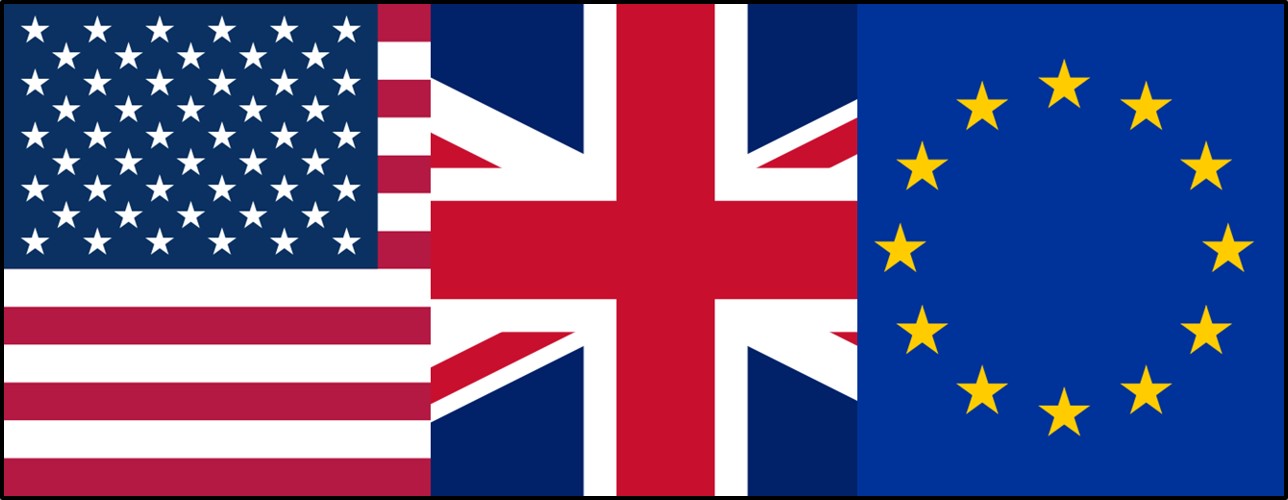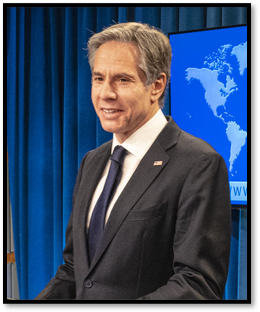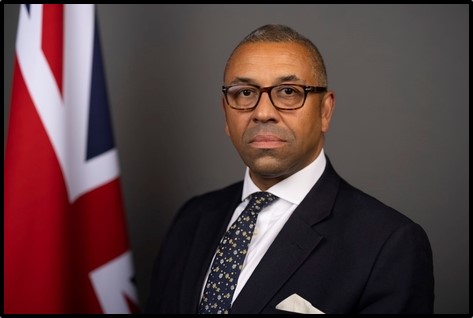On April 24, the United States, Britain, and the European Union sanctioned more than a dozen Iranian government and security officials, particularly those linked to the Islamic Revolutionary Guard Corps (IRGC), as well as a mobile service provider. The listed men and company had suppressed and censored Iranians during nationwide protests that erupted in September 2022. “The United States condemns Iran’s continued human rights abuses and remains committed to supporting the people of Iran as they face the brutality of the Iranian regime and demand respect for their fundamental freedoms,” Secretary of State Antony Blinken said in a statement.
 The coordinated action by 29 nations, which include some of the world’s largest economies, reflected widespread outrage over the Islamic Republic’s human rights violations. The international partners would “not overlook the regime’s brutal oppression,” British Foreign Secretary James Cleverly vowed. “We will continue to take a range of action to hold the regime to account for its actions.”
The coordinated action by 29 nations, which include some of the world’s largest economies, reflected widespread outrage over the Islamic Republic’s human rights violations. The international partners would “not overlook the regime’s brutal oppression,” British Foreign Secretary James Cleverly vowed. “We will continue to take a range of action to hold the regime to account for its actions.”
The U.S. move marked the 11th round of sanctions between September 2022 and April 2023 imposed over the government crackdown. The sanctions froze all assets of the designated people and company in the United States and restricted any transactions using dollars or the American financial system. The United States also imposed visa restrictions on 11 government officials involved in rights abuses. The following are lists of those sanctioned and statements from the United States, Britain, and European Union.
The United States sanctioned the following five men:
- Parviz Absalan, deputy IRGC Salman Corps commander in Sistan and Baluchistan province
- Amanollah Goshtasbi, deputy inspector of the IRGC Ground Forces
- Ahmed Khadem Seyedoshohada, brigadier general in the IRGC Ground Forces and commander of the IRGC Karbala Operational Base
- Salman Adinehvand, commander of the Law Enforcement Forces Tehran Police Relief Unit
- Seyyed Mohammad Amin Aghamiri, secretary of the Supreme Council on Cyberspace
Britain sanctioned more than 70 government officials and organizations for rights abuses between October 2022 and April 2023. The British sanctions in April 2023 targeted IRGC commanders. They froze assets of those cited in Britain. The move also banned travel to Britain.
Britain sanctioned the following four men:
- Mohammad Nazar Azimi, commander of the IRGC Najaf Ashraf West Headquarters
- Habib Shahsavari, commander of the IRGC provincial corps in West Azerbaijan province
- Mohsen Karimi, commander of the IRGC in Markazi province
- Ahmad Kadem, commander of the IRGC Karbala Operational Base (also sanctioned by the United States)
The E.U. sanctions marked the seventh round imposed on Iran between October 2022 and April 2023. The latest designations focused on the IRGC Cooperative Foundation, which supports Iran’s foreign operations and proxies and has been targeted previously by the United States and Britain. The foundation also serves as a slush fund for military personnel and their business interests, according to a U.S. Treasury statement in January 2023. The sanctions also froze assets of those cited in the European Union and banned travel to the 27 countries. The E.U. designations prohibited anyone from providing funds or resources to those designated.
The European Union sanctioned the following eight men and company:
- Bijan Nobaveh Vatan, member of Parliament and first deputy chairman of the Culture Commission
- Ali Yazdikhah, member of Parliament and member of the Culture Commission
- Mehdi Alibabaei, provincial deputy of the IRGC in Qom
- Ali Asghar Nourouzi, chairman of the IRGC Cooperative Foundation board of directors
- Seyyed Amin Ala Emami Tabatabai, managing director of the IRGC Cooperative Foundation and vice chairman of the board of directors
- Yahya Alaoddini, member of the IRGC Cooperative Foundation board of directors
- Jamal Ali Babamoradi, member of the IRGC Cooperative Foundation board of directors
- Ahmad Hasan Karimi, member of the IRGC Cooperative Foundation board of directors
- Ariantel, an Iranian mobile service provider that supported government efforts to surveil telecommunications
Secretary of State Blinken

“The United States condemns Iran’s continued human rights abuses and remains committed to supporting the people of Iran as they face the brutality of the Iranian regime and demand respect for their fundamental freedoms.
“Today, the Department of State is taking action to impose visa restrictions pursuant to Immigration and Nationality Act (INA) section 212(a)(3)(C) on 11 Iranian government officials, who are believed to be responsible for, or complicit in, the abuse, detention or killing of peaceful protestors or inhibiting their rights to freedom of expression or peaceful assembly.
“The Department of the Treasury is also designating four individuals in connection with serious human rights abuses in Iran. All four officials are directly linked to LEF and IRGC units that were implicated in the violent suppression of protests in Iran. Treasury is also designating the Secretary of the Supreme Council of Cyberspace, a U.S. designated entity.
“Today’s actions were taken in close coordination with the United Kingdom — the U.S. will continue to coordinate with our allies and partners to promote accountability for the Iranian regime’s continued human rights abuses.”
Treasury Department
Today, the Department of the Treasury’s Office of Foreign Assets Control (OFAC) sanctioned four senior officials of the Law Enforcement Forces of Iran (LEF) and Islamic Revolutionary Guard Corps (IRGC), the primary Iranian security forces responsible for the regime’s brutal suppression of the protests that broke out in September 2022 following the arrest and death of Mahsa Jina Amini while in the custody of Iran’s Morality Police. OFAC is also taking action against the new Secretary of Iran’s Supreme Council of Cyberspace (SCC), the authority responsible for Iran’s cyberspace policy and blockage of popular websites. Today’s action is being taken in coordination with the United Kingdom, which is also imposing similar sanctions on senior Iranian security officials.
 “The Iranian people deserve freedom of expression without the threat of violent retaliation and censorship from those in power,” said Under Secretary of the Treasury for Terrorism and Financial Intelligence Brian E. Nelson. “Along with our key allies and partners, such as the United Kingdom, the United States will continue to take action against those responsible for the regime’s violent repression and censorship.”
“The Iranian people deserve freedom of expression without the threat of violent retaliation and censorship from those in power,” said Under Secretary of the Treasury for Terrorism and Financial Intelligence Brian E. Nelson. “Along with our key allies and partners, such as the United Kingdom, the United States will continue to take action against those responsible for the regime’s violent repression and censorship.”
OFAC has imposed 11 rounds of sanctions actions targeting the Iranian regime and its security elements and officials that are involved in brutal crackdown on peaceful demonstrations since nationwide protests began in September 2022. Today’s designations are pursuant to Executive Order (E.O.) 13553, which authorizes the imposition of sanctions on certain persons with respect to serious human rights abuses by the Government of Iran, and E.O. 13846, which authorizes sanctions on persons who engage in censorship or other activities with respect to Iran.
OFAC designated the IRGC and the LEF pursuant to E.O. 13553 on June 9, 2011, for being responsible for or complicit in serious human rights abuses in Iran since the June 2009 disputed presidential election. The IRGC is also designated pursuant to E.O. 13382 and E.O. 13224. OFAC designated Iran’s SCC on January 12, 2018, for engaging in censorship and inhibiting free expression in Iran, pursuant to E.O. 13628, which was later revoked and superseded by E.O. 13846.
The Department of State is also taking action today to impose visa restrictions pursuant to Immigration and Nationality Act (INA), section 212(a)(3)(C), on 11 additional Iranian government officials who are believed to be responsible for, or complicit in, the abuse, detention, or killing of peaceful protestors or inhibiting their rights to freedom of expression or peaceful assembly.
ISLAMIC REVOLUTIONARY GUARD CORPS LEADERS
Parviz Absalan (Absalan) is the Deputy Commander of the IRGC Salman Corps of Sistan and Baluchistan Province. The Salman Corps were involved in the violent suppression of protests in Sistan and Baluchistan, which resulted in some of the highest casualties nationwide following the outbreak of protests in September 2022.
Amanollah Goshtasbi (Goshtasbi) is the Deputy Inspector of the IRGC’s Ground Forces. He was previously the Commander of the IRGC’s Salman Corps, during which forces under his command are alleged to have opened fire on Baluch citizens on multiple occasions, leading to several deaths.
Ahmed Khadem Seyedoshohada (Seyedoshohada) is a Brigadier General in the IRGC’s Ground Forces and has been Commander of the IRGC’s Karbala Operational Base since at least 2020. During the protests in 2022, IRGC troops under his command allegedly used live ammunition against protesters in the towns of Khorramabad, Lorestan province and Izeh, Khuzestan province.
Absalan, Goshtasbi, and Seyedoshohada are being designated pursuant to E.O. 13553 for having acted, or purported to act, for or on behalf of, directly or indirectly, the IRGC, an entity designated pursuant to E.O. 13553.
LAW ENFORCEMENT FORCES LEADER
Salman Adinehvand (Adinehvand) is the current Commander of the Tehran Police Relief Unit of Iran’s LEF, the primary security organization in charge of crowd control and protest suppression. Adinehvand’s unit was directly responsible for the violent suppression of protests in Tehran in September and October 2022, during which dozens of protestors were killed by security forces using live ammunition.
Adinehvand is being designated pursuant to E.O. 13553 for having acted or purported to act for or on behalf of, directly or indirectly, the LEF, an entity designated pursuant to E.O. 13553.
SUPREME COUNCIL ON CYBERSPACE LEADER
Seyyed Mohammad Amin Aghamiri (Aghamiri) is the new Secretary of Iran’s SCC, the centralized authority regarding policymaking in the realm of cyberspace. The SCC is responsible for Iran’s blockage of popular online news and communications platforms and has also used digital technology to spy on and harass journalists and regime dissidents.
Aghamiri is being designated pursuant to E.O. 13846 for having acted, or purported to act, for or on behalf of, directly or indirectly, the SCC, an entity designated pursuant to E.O. 13628, which was revoked and superseded by E.O. 13846.
SANCTIONS IMPLICATIONS
As a result of today’s action, all property and interests in property of these persons that are in the United States or in the possession or control of U.S. persons must be blocked and reported to OFAC. In addition, any entities that are owned, directly or indirectly, 50 percent or more by one or more blocked persons are also blocked. All transactions by U.S. persons or within the United States (including transactions transiting the United States) that involve any property or interests in property of blocked or designated persons are prohibited.
In addition, persons that engage in certain transactions with the persons designated today may themselves be exposed to sanctions or subject to an enforcement action. Furthermore, unless an exception applies, any foreign financial institution that knowingly facilitates a significant transaction or provides significant financial services for any of the persons designated today could be subject to U.S. sanctions.
The power and integrity of OFAC sanctions derive not only from OFAC’s ability to designate and add persons to the SDN List, but also from its willingness to remove persons from the SDN List consistent with the law. The ultimate goal of sanctions is not to punish, but to bring about a positive change in behavior. For information concerning the process for seeking removal from an OFAC list, including the SDN List, please refer to OFAC’s Frequently Asked Question 897 here. For detailed information on the process to submit a request for removal from an OFAC sanctions list, please click here.
Click here for identifying information on the individuals designated today.
Britain
The UK, US and EU are today announcing further sanctions on Iranian regime officials responsible for human rights violations, including from the Islamic Revolutionary Guard Corps (IRGC).
The UK has designated more than 70 Iranian officials and entities for human rights violations since October 2022, with the total number of Iran-related designations amounting to more than 300. The list includes the Islamic Revolutionary Guard Corps in its entirety, the Iranian Prosecutor General and the Morality Police.
The UK, US and EU have taken consistent and coordinated action to hold the regime to account, announcing sanctions on a monthly basis on those response for human rights abuses. The latest UK sanctions are against 4 IRGC commanders, under whose leadership IRGC forces have opened fire on unarmed protestors resulting in numerous deaths, including of children, and have arbitrarily detained and tortured protestors.

Foreign Secretary James Cleverly said:
"The Iranian regime are responsible for the brutal repression of the Iranian people and for exporting bloodshed around the world. That’s why we have more than 300 sanctions in place on Iran, including on the IRGC in its entirety.
"The UK and our international partners are again making clear today that we will not overlook the regime’s brutal oppression. We will continue to take a range of action to hold the regime to account for its actions."
Those sanctioned include:
- Mohammad Nazar Azimi: IRGC Commander Najaf Ashraf West HQ, responsible for the violent repression of protests in Kermanshah Province, with IRGC forces using machine guns against unarmed protestors resulting in multiple deaths
- Habib Shahsavari: IRGC Commander provincial corps West Azerbaijan Province, responsible for repression of protestors in Mahabad and Piranshahr, with IRGC forces using heavy weapons that resulted in multiple deaths. IRGC forces are accused of the death of protestors following torture in detention facilities
- Mohsen Karimi: IRGC commander Markazi Province, responsible for the violent repression of protests, including 19-year-old protestor Mehrshad Shahidi who was reportedly beaten to death in an IRGC detention centre, and the arrest of women for failing to wear the hijab (head covering) in public
- Ahmad Kadem: IRGC Commander of the Operational Base Karbala, responsible for the repression of protests in the town of Izeh, Khuzestan Province, during which a 10-year-old child was shot and killed. IRGC forces under the command of Kadem in Kohgilyeh and Boyer-Ahmad Province are blamed for the abduction of a child labour activist who subsequently died after torture
The UK has also played a leading role in international efforts to hold the Iranian regime to account for its repression, for example through working with partners to kick Iran off the UN Commission on the Status of Women and to establish a UN-led investigation into the response to the protests.
These sanctions will ensure that the individuals on the list cannot travel to the UK and any of their assets held in the UK will be frozen.
European Union
The Council decided today to impose restrictive measures on eight additional individuals and one entity responsible for serious human rights violations in Iran.
The Council is sanctioning Ariantel, an Iranian mobile service provider, which contributed to the telecommunications surveillance architecture mapped out by the Iranian government to quash dissent and critical voices in Iran.
New listings also include lawmakers in the Iranian Parliament, members of the Islamic Revolutionary Guard Corps (IRGC) and the IRCG Cooperative Foundation, which is the body responsible for managing the IRGC’s investments and in that framework responsible for funnelling money into the regime’s brutal repression.
Restrictive measures now apply to a total of 211 individuals and 35 entities. They consist of an asset freeze, a travel ban to the EU and a prohibition to make funds or economic resources available to those listed. A ban on exports to Iran of equipment which might be used for internal repression and of equipment for monitoring telecommunications is also in place.
The European Union and its member states urge the Iranian authorities to stop any form of violent crackdown against peaceful protests, cease their resort to arbitrary detentions as a means of silencing critical voices, and release all those unjustly detained.
The EU calls on Iran to end the practice of imposing and carrying out death sentences against protesters, reverse the death penalty sentences pronounced, as well as provide due process to all detainees. The EU also calls upon Iran to end the distressing practice of detaining foreign civilians with a view to making political gains.
Today’s package of listings complements the previous six packages adopted by the Council on 17 October, 14 November, and 12 December 2022, 23 January, 20 February and 20 March 2023.
The relevant legal acts have been published in the Official Journal of the EU.
